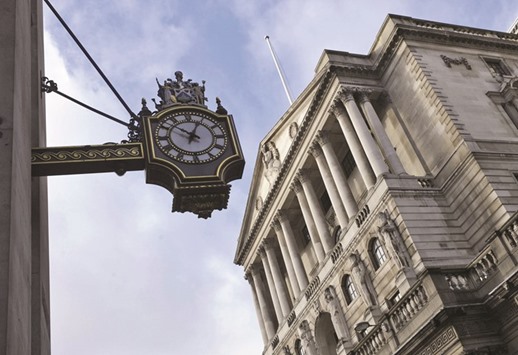The chances of a UK interest-rate cut are rising.
Economists in Bloomberg’s monthly survey put the likelihood of a reduction in the Bank of England’s benchmark rate this year at 23%. While that’s still a long shot, the odds are up from just 10% a month ago.
The shift follows remarks from BoE officials including Governor Mark Carney that the Monetary Policy Committee has room to ease again if needed. The next rate decision is this week and though economists say the UK doesn’t need more stimulus now, the big risk on the horizon is June’s European Union referendum. A vote to leave the bloc could push Britain toward a recession and force the BoE to respond. “A vote for ‘Brexit’ might change the landscape and tip the balance in favour of easing, but this is something we will only be able to evaluate properly after the referendum,” said Peter Dixon, an economist at Commerzbank in London. “So long as growth holds up and inflation doesn’t go into reverse, I would expect the MPC to stand pat.”
Yet even excluding the potential of the EU vote to sap confidence, the outlook has dimmed. The BoE cut its growth forecasts in February and services, the biggest part of the economy, grew the slowest in three years. While the MPC is forecast to keep its key rate at a record-low 0.5% tomorrow, policy maker Gertjan Vlieghe has said that if prospects worsen, he would consider voting to cut.
“The weakness of recent activity surveys suggests an interest-rate cut will be discussed,” said Samuel Tombs, an economist at Pantheon Macroeconomics. There’s an outside chance that one member will vote to loosen, though they’ll likely “reiterate that rates are ‘more likely than not’ to rise over the next two years,” he said.
The BoE’s meeting takes place against the backdrop of Chancellor of the Exchequer George Osborne’s annual budget, which is due on Wednesday. His push to meet his fiscal mandate — a surplus by 2020 — will see the UK facing an even bigger squeeze on government spending over the coming years. He told the BBC on Sunday that the world is a “more uncertain place.”
Respondents in the Bloomberg survey — conducted between March 4 and March 11 — predicted a UK economic expansion of 2% this year, down from 2.2% forecast last month. Their 2017 prognosis remains unchanged at 2.2%.
Those estimates could change if voters opt for Brexit. In a poll in February, economists said it would push the odds of a UK recession to 40%.
“A sharp rise in uncertainty would harm business and household confidence, causing investment and spending to decline,” Kallum Pickering, an economist at Berenberg in London, said in a note on Monday. If the UK left the European Union, a recession would be possible, unemployment would rise, the BoE would loosen monetary policy and fiscal deficits would increase, he said.
A rate reduction this year may be the minority view among economists, but feeble UK inflation also means an increase is probably far off. Analysts pushed back the predicted timing of a hike to the first quarter of 2017 from the fourth quarter of 2016.
UK inflation was 0.3% in January, compared with the BoE’s 2% target. Carney forecasts that it’ll pick up to the goal by 2018 as pay improves and the impact of lower oil prices fades.
Labour-market data on Wednesday will probably show that wage growth accelerated slightly in January. BoE research published last week suggested that some of the forces damping earnings are subsiding, while the pound’s recent depreciation could add to upside inflation pressures.
“If we’re correct about the performance of the domestic and the global economies, it’s still quite possible to see an interest-rate hike by the end of this year,” said Investec economist Phil Shaw. “That remains our central, if slightly uncertain, view.”

A view of the Bank of England in London. Economists in Bloomberg’s monthly survey put the likelihood of a reduction in the BoE’s benchmark rate this year at 23%. The next rate decision is this week and though economists say the UK doesn’t need more stimulus now, the big risk on the horizon is June’s European Union referendum.
